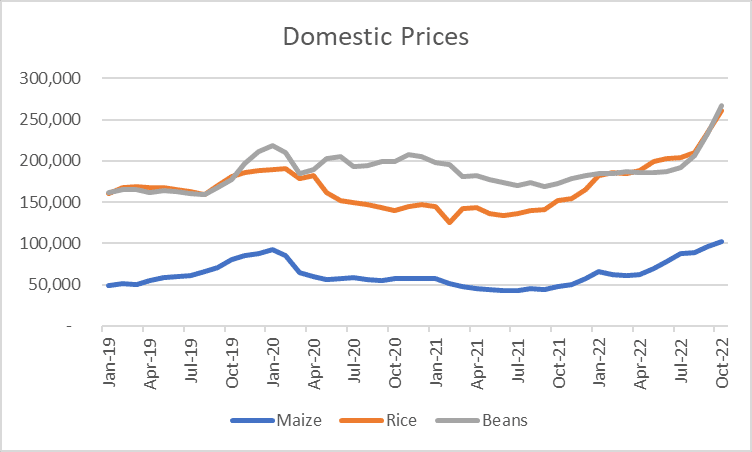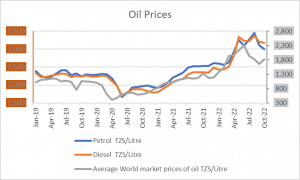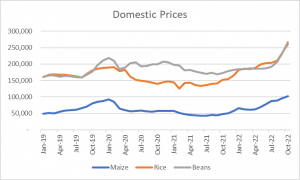
Deliver us from the effects of the COVID-19 pandemic and the crisis in Eastern Europe.
Recent Downturns
COVID-19 was a hard blow to the people in developing economies, especially in sub-Saharan Africa, where 42% live below the poverty line. However, some countries were improving, including Tanzania, whose status improved into a Lower Middle-income country after attaining a real Gross Domestic Product of more than 6% and a Gross National Income per capita of $1,080 in 2019. This was an increase from $1,020 in 2018, representing a 5.88% growth in one year. However, Tanzania is not exempt from the effects of COVID-19, as 70 million people across the globe were forced back into extreme poverty due to the pandemic.
While planning to recover from the effects of COVID-19, Russia started Operation Crimea, which caused the ongoing Russo-Ukrainian War. There are several wars and conflicts in the world; however, the Russo-Ukrainian War has created a different story for African countries, as African countries felt the impacts within 30 days of the war. A month of crisis has caused an increase in food prices in sub-Saharan Africa, a compounding effect on countries already dealing with famine.
The funds that Africa has been receiving from developed countries have dropped as the funds are now allocated to the war. This will hurt the people who were employed by the funded projects. The International Monetary Fund has forecasted that the economy will be more brutal in 2023 compared to 2022 due to the Russo-Ukrainian war. It is like a triple blow to the poor people.

Data Source: Bank of Tanzania
The oil prices in Tanzania followed the trends of the oil prices in the world market; however, in June 2022, the trends started to differ. The decline in world prices was reflected by an increase in petrol and diesel prices, which may be a response to government oil subsidies or just time lags.
Redemption
During the COVID-19 pandemic, authorities took various initiatives to promote production. The Bank of Tanzania lowered statutory reserve requirements and interest rates, recognized the importance of mobile transactions, and relaxed agent banking criteria. Interest rates paid on mobile money trust accounts were also reduced.
Several steps were taken when the Russo-Ukrainian War’s effects hit Tanzania. The government subsidized oil to lower oil prices; however, the prices of cereals increased. The food prices in October 2022 are higher than the previous prices, attributable to the effects of the war.

Domestic prices (Tsh/100kgs)
Data Source: Bank of Tanzania
While the COVID-19 pandemic and the Russo-Ukrainian war have been a heavy burden for poor people in Tanzania, other internal challenges have impacted the cost of living.
The body punches
Steps taken by the Tanzanian government seem to worsen the situation for the poor people who are already in pain due to the current situation. The minimum wage was increased by 23.3% in July 2022 from Tsh. 315,000, which is largely unsustainable. This is relative to the Trade Union Congress of Tanzania’s (TUCTA) suggested minimum wage of Tsh. 1,010,000, which was seen as sufficient to sustain an employee for a month.
While the world is moving to the digital economy, Tanzania has witnessed an increase in data bundle prices, limiting free speech and the ability to exploit e-opportunities. Mobile transaction costs rose by almost 40% after the introduction of the mobile transaction levy, on top of the 18% in Value Added Tax. Farmers and peasants have voiced complaints, including delays in receiving subsidized agricultural inputs.
The African Development Bank (AfDB) has announced plans to mobilize one billion dollars to improve the agriculture sector in Africa and counter the impacts. Improvements to the agricultural sector are expected to be visible within three years. However, this is not an emergency solution for times when African countries are experiencing a rise in wheat prices, and some are already in a full-blown famine.
Immediate solution
The COVID-19 pandemic and the Russo-Ukrainian war have had immediate impacts on people. There is an urgent need for a solution. Angela Lusigi proposed that the immediate solution is to make “Made in Africa” products and services freely exchanged across borders in one African Market by implementing the African Continental Free Trade Area (AfCFTA). However, increasing the exploitation of e-opportunities by reducing the costs of data and data bundles would improve the situation. This can be supported by reducing unnecessary expenditures such as upholding “African Values” by raiding prostitutes and arresting and convicting homeless people for being rogue and vagabonds.
Francis Nyonzo is an economist interested in social justice and digital rights. He is available at [email protected]. These are the writer’s own opinions and do not necessarily reflect the viewpoints of Liberty Sparks. Do you want to publish in this space? Contact our editors at [email protected] for further clarification.



